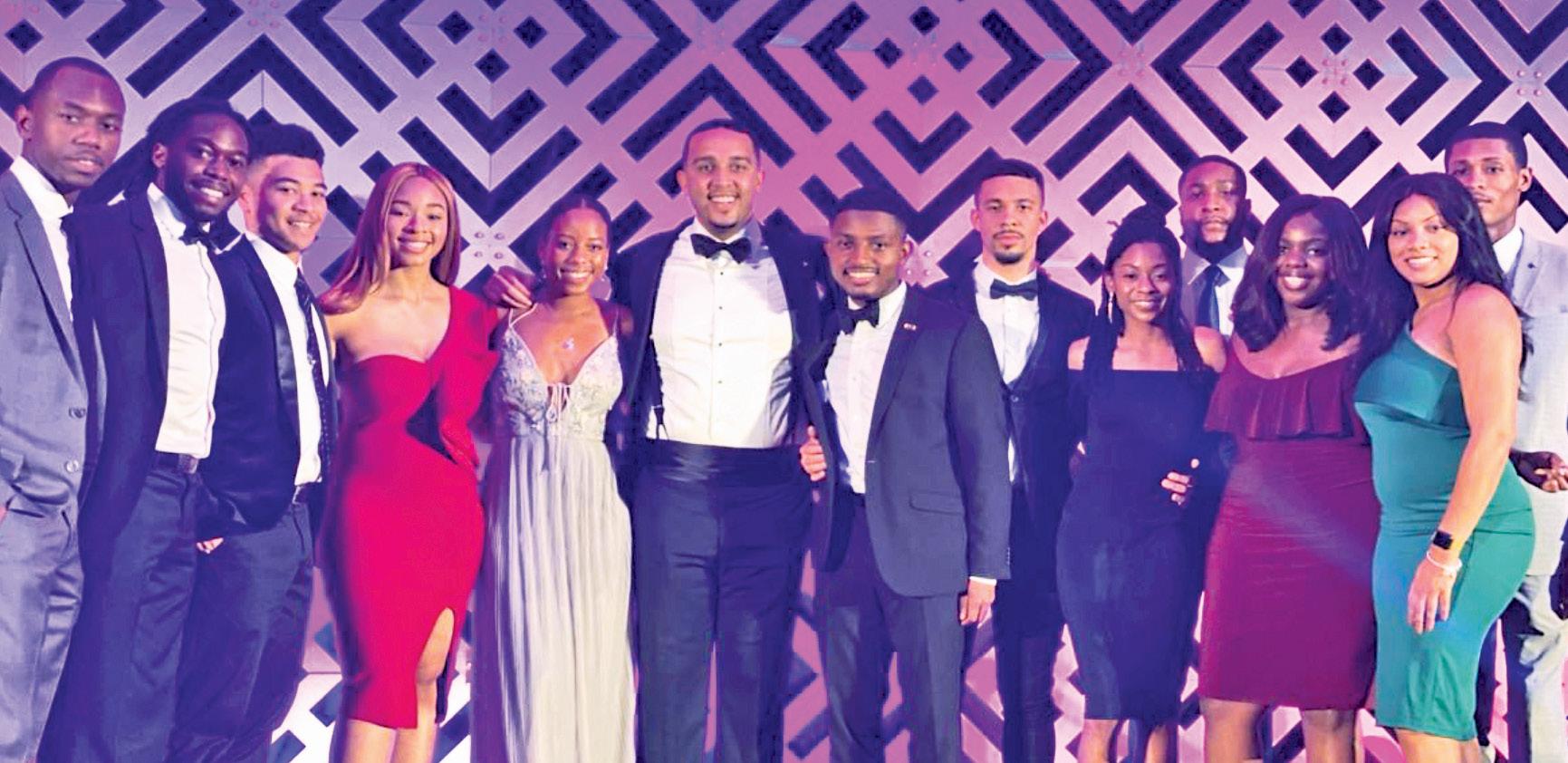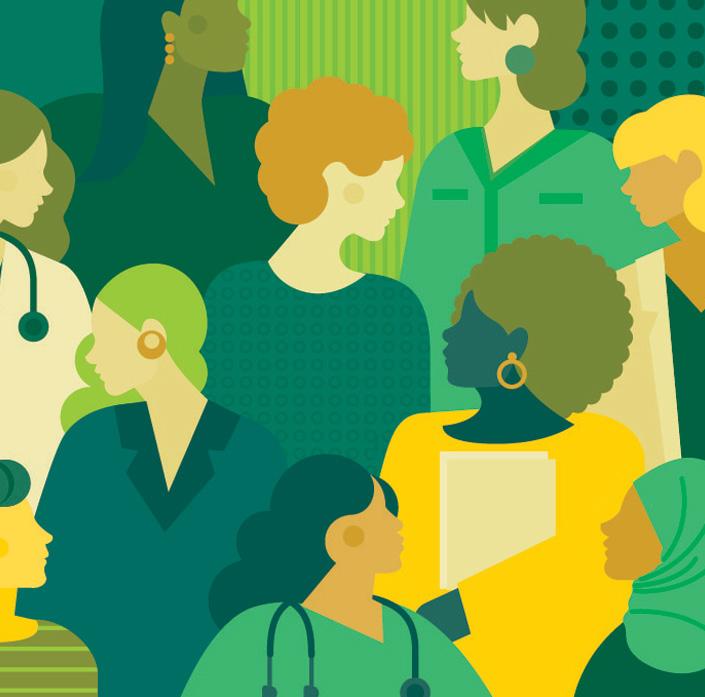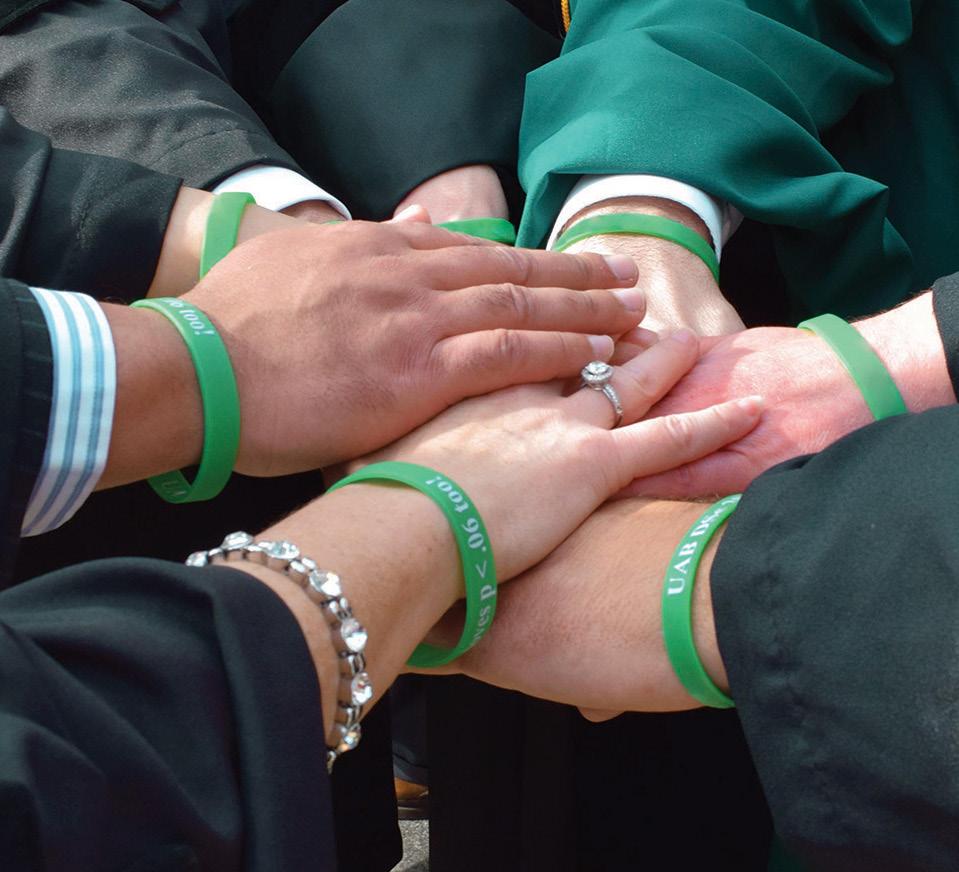
8 minute read
DEI Update
We Become What We See
JESSICA H. WILLIAMS, PHD Director of Diversity, Equity & Inclusion, Associate Professor
Colleagues,
We become what we see. What a dynamic statement about the power of our environment in shaping our view of the world. Our Department mission is “Developing leaders to shape tomorrow’s health care” and “We believe our diversity is a source of our strength and strive to understand, value and involve all.” It is imperative that we demonstrate the importance of inclusive excellence. Will Durant so eloquently paraphrased Aristotle with the now famous quote “We are what we repeatedly do. Excellence, then, is not an act, but a habit.”
Creating a habit of inclusive excellence is neverending work. It requires a willingness to think differently and move beyond the tendency of our current culture of only associating with people who look or think like us. Our work begins by thoughtfully considering the people who are in the room— including dimensions of gender, age, ethnicity, ability, income, geographical birthplace, language, and thought.
A quick glimpse of our Department demonstrates the many dimensions of visible diversity, but I
think the best part and most inspiring part of our diversity is that which is not seen — the collection of experiences and world views mixed with collegiality.
We are still striving to employ strategies that allow us to hire, retain, and promote diversity.
As the newly appointed Director of Diversity, Equity, and Inclusion (DEI), I find the gravity of this position greater than I ever could have imagined— especially in post-George Floyd America. As a Black woman who grew up in a small town in Alabama, I am all too familiar with the boxes and labels people have and will ascribe to me. My parents, probably like yours, taught me the value of an education and the importance of working hard and diligently for what I wanted. As I worked my way through undergrad at Birmingham-Southern College, then grad school at UAB, I felt the weightiness of needing to succeed, knowing that there were others who were not afforded the same opportunities.
On numerous occasions, I have had to prove that I was more than a stereotype. I have often been at the top of the curve and I have struggled through classes, but felt too uncomfortable or ashamed to ask for help when I needed it most. I have been the only person who looks like me in a board or meeting room. I have learned the value of surrounding myself with people of different backgrounds, of overcoming the awkwardness of difference and embracing similarities. I know this can be challenging for everyone, regardless of race. However, I know the weight of George Floyd’s death has served as a wake-up call that we can all do more. I want to use my position and influence to facilitate such discussions and the formation of new relationships in whatever way that I can.


The Importance of Inclusive Excellence
How we see ourselves has important implications
for how we interact with the world. There is no way I could have navigated my way through college and as a working professional if I only saw myself as a Black woman. My identity is so much more than the color of my skin. I am a wife, a mother, a daughter, a sister, and a friend. There is no way I could have survived academia without a strong support system.
What I have learned the most about inclusive excellence is that some of the people who have
helped me the most looked nothing like me. I hope to impart to students the importance of relationships and that looking for ways to find commonalities with the people around us is critically important, despite differences in our skin color, socioeconomic status, and culture. I hope to inspire students to find common ground and learn how to work together towards a common end. If it is true that we become what we see, it is my hope that the students in our programs will see the importance of building relationships with people who are different from them.
Perhaps inclusion is the most important and most challenging piece of the DEI puzzle. A mere change in diversity without careful thought to fostering inclusion can entirely derail our efforts. In the book Radical Inclusion, the authors state, “Belonging to a community or a cause bigger than ourselves is core to our very humanity.” In our Department, we feel it is vitally important to foster an atmosphere of inclusion and community. We are all investing in learning and leading our classrooms into inclusive excellence.
Our phenomenal faculty and staff work hard each and every day to ensure our students are prepared to work and lead in a diverse world. This year during MSHA program orientation, each incoming student received the book What If I Say the Wrong Thing by Verna Myers as a tool and resource to use as they navigate relationships.
At the core of inclusion is the commonality of
our humanness. The most important thing I have learned to date and the one thing I know that will continue to bind us all is our humanity. Our pain, our struggles, our imperfections are what make us human. Leaning into our humanness allows us to embrace those imperfections. In learning about DEI, we are becoming more self-aware. What better way to engage our students than through a place of vulnerability?
Dr. Lemak has empowered us with something much more than the power to make change—influence. Our 360-degree approach to leadership in inclusive excellence is changing our environment at UAB and nationally. We have a tremendous opportunity to not only develop leaders to shape tomorrow’s health care, but to also influence them in ways of compassion and grace in interacting with others—especially those who are different than they are. I truly believe that
this has the potential to not only shape tomorrow’s
health care, but to transform it. We become what we see. HSA is working to ensure that what others see is inclusive excellence.
Sincerely,


Departmental Efforts in Inclusive Excellence
Expanded DEI Opportunities
◗ Case Competition at National
Association of Health Services Executives (NAHSE) conference
– non-profit association of Black health care executives. ◗ Academy for Addressing Health Disparities – prepares underrepresented minorities and first-generation undergraduate students for graduate school. ◗ Introduction to Cultural Awareness and Competency – undergrad course for application of cross-cultural knowledge and skills in education, health care, and business. ◗ Removed GRE/GMAT requirements – removing biased entrance exams improves fairness in our admissions process. ■
HSA students and alumni at 2019 NAHSE Conference.

My first experience at NAHSE was eye opening. Before entering UAB’s MSHA program, I wasn’t aware such a community existed — to know that there are so many successful minorities in the healthcare industry was comforting. If we put in the work, we too can be successful, like those that have paved the way for us and the ones we met at NAHSE.
— MSHA CLASS 55 STUDENT
We thank you for your support, which provides students with opportunities to experience different people, new voices and independent ideas in health care.
Women in Healthcare Leadership
Around campus and in the community, we support activities designed for all HSA students and alumni in order to help develop organizations where all can thrive. Our efforts include: ◗ Highlighting successful female leaders through awards/presentations ◗ Establishing mentoring programs for mid-career women and students ◗ Providing programming that promotes inclusive leadership

We recognize and embrace the benefits that come from women’s leadership styles and how they differ from their male counterparts. And we are committed to equipping women to lead in health care organizations. ■
Visit go.uab.edu/WIHL to learn more.

Alumni & Student Initiatives Related to Inclusive Excellence



Executive DSc in Healthcare Leadership Program
establishes the Executive
Doctoral Endowed Scholarship for Diversity and Inclusion in
Healthcare Leadership to remove barriers for students. Faculty are also working to infuse DEI into the program.
go.uab.edu/dscgive MSHA Student Organization Recommends Implementation:
More resources and materials prior to orientation to facilitate deeper conversations about race, religion, gender, etc.
More diversity among guest lecturers and speakers as well as the active engagement of MSHA alumni to discuss DEI issues with current students. Sarah Hill, MD (SIM 2021) noticed a 15-year difference in life expectancy between the West and East ends of Louisville, Kentucky. Added to the fact the city is a center of Black Lives Matter activity, they declared racism an official public health emergency. Hill plans to incorporate poverty simulation for her health care students at the University of Louisville Hospital. ■
Research Related to Inclusive Excellence
Interactive Technical Assistance Workshop.
Monica Aswani, PhD and Allyson Hall, PhD
featured in BirminghamWatch,“Health Care Disparities: Access to Treatment, Insurance Isn’t Colorblind.”
Ron Wyatt, MD (MSHA Class E41) co-authored and Discrimination: How can Health Administration
a Black Lives Matter blog - “I Was Blind But Now I See” in International Society for Quality in Health Care.
Jessica Williams, PhD was funded for a $50,000 Research Center (DRC) and the UAB Comprehensive Diabetes Center (UCDC) for her proposal: “Clinician Implicit Bias and Perceived Barriers to Medication Intensification: A Pilot & Feasibility Study” Soumya Niranjan, PhD was selected to participate in the NCI CRCHD Partnerships to Advance Cancer Health Equity Program (PACHE)
Rob Weech-Maldonado, PhD was a panelist for the AUPHA Discussion on Racism, Social Injustice, Pilot and Feasibility Program of the UAB Diabetes
Education Make a Difference?
Nataliya Ivankova, PhD received funding for Designing a Plan of Action for Better Access and Quality of Surgery for African-Americans with Gastrointestinal Cancers in the Deep South. ■










